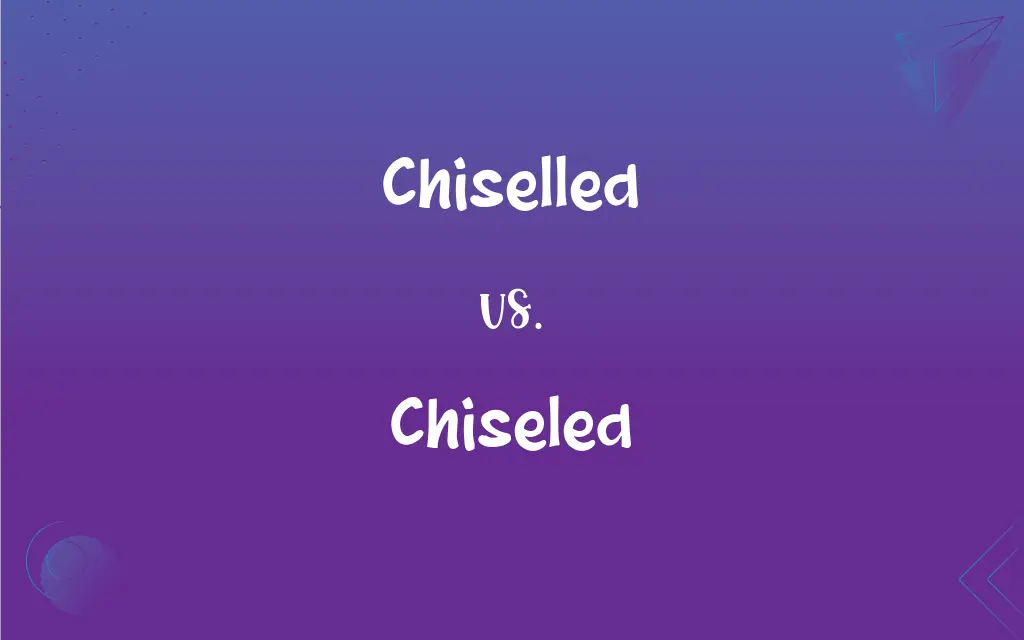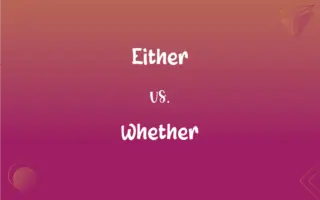Chiselled vs. Chiseled: What's the Difference?
By Harlon Moss & Janet White || Updated on May 22, 2024
"Chiselled" and "chiseled" are different spellings of the same word, with "chiselled" being the British English variant and "chiseled" being the American English variant, both referring to something shaped or sculpted with a chisel.

Key Differences
"Chiselled" is the British English spelling of the word used to describe something that has been shaped or sculpted using a chisel. This form is commonly used in British publications and follows the British convention of doubling the consonant before adding the "-ed" suffix. "Chiseled," on the other hand, is the American English spelling of the same word. In American English, the single "l" before the "-ed" suffix is standard, and this spelling is prevalent in American writings and contexts.
Both terms refer to the same concept of being shaped, cut, or sculpted with a chisel. The difference lies purely in regional spelling conventions. The process and the result described by both words are identical, emphasizing precise, sharp, and well-defined features.
"Chiselled" and "chiseled" can describe both physical objects, such as statues or stonework, and figurative uses, such as describing a person's sharply defined features. For example, one might say, "He has a chiselled jawline" in British English, while in American English, it would be "He has a chiseled jawline."
Both spellings are understood internationally, but it’s essential to use the correct form based on the intended audience or regional convention to maintain proper spelling consistency.
"Chiselled" and "chiseled" serve the same linguistic purpose, with the primary distinction being the regional preference between British and American English.
ADVERTISEMENT
Comparison Chart
Spelling
Chiselled with double "l"
Chiseled with single "l"
Regional Usage
Common in British English publications
Common in American English publications
Application
Describes something shaped with a chisel
Describes something shaped with a chisel
Example Usage
"He has a chiselled jawline."
"He has a chiseled jawline."
Figurative Use
Yes, describing sharply defined features
Yes, describing sharply defined features
ADVERTISEMENT
Chiselled and Chiseled Definitions
Chiselled
Created with great skill and detail.
The ancient ruins featured beautifully chiselled reliefs.
Chiseled
Finely detailed and crafted.
The chiseled patterns on the vase were stunning.
Chiselled
Clearly and sharply defined.
The artist's chiselled lines gave the drawing a dramatic effect.
Chiseled
Clearly and sharply defined.
The chiseled edges of the metalwork caught the light beautifully.
Chiselled
Shaped or sculpted with a chisel.
The artisan chiselled the marble statue with precision.
Chiseled
Shaped or sculpted with a chisel.
The sculptor chiseled the stone into a delicate figure.
Chiselled
Having a well-defined, sharp appearance.
His chiselled features made him look like a classic sculpture.
Chiseled
Having a well-defined, sharp appearance.
The actor's chiseled jaw was admired by many.
Chiselled
Finely detailed and crafted.
The wooden furniture had a beautifully chiselled design.
Chiseled
Created with great skill and detail.
The building's façade was intricately chiseled by artisans.
Chiselled
Made or shaped with or as if with a chisel
A finely chiseled nose.
Chiseled
Made or shaped with or as if with a chisel
A finely chiseled nose.
Chiselled
A metal tool with a sharp beveled edge, used to cut and shape stone, wood, or metal.
Chiseled
(US) Having strongly defined facial features.
Chiselled
To shape or cut with a chisel.
Chiseled
(of a physique) Having well-developed muscles with minimal bodyfat.
Chiselled
To cheat or swindle.
Chiseled
(US) chisel
Chiselled
To obtain by deception.
Chiseled
Having a clean and distinct outline as if precisely cut along the edges;
A finely chiseled nose
Well-defined features
Chiselled
To use a chisel.
Chiselled
To use unethical methods; cheat
"who's up, who's down and who's chiseling on the side" (James Reston).
Chiselled
To intrude oneself without welcome
Always tries to chisel in on our conversations.
Chiselled
(British) chisel
Chiselled
(British) chiseled
FAQs
Can "chiselled" and "chiseled" be used interchangeably?
Yes, they can be used interchangeably, but it’s best to use the regional spelling appropriate for your audience.
Do "chiselled" and "chiseled" have different meanings?
No, both words have the same meaning and usage.
What is the difference between "chiselled" and "chiseled"?
"Chiselled" is the British English spelling, while "chiseled" is the American English spelling.
Where would you use "chiseled"?
Use "chiseled" in American English contexts, such as in US publications or when writing for an American audience.
Are there other words with similar regional spelling differences?
Yes, examples include "travelled" (British) vs. "traveled" (American) and "labelled" (British) vs. "labeled" (American).
Is there a preference for "chiseled" or "chiselled" in Canada?
Canadian English tends to follow British English conventions, so "chiselled" is more common.
Is "chiseled" more common in American English?
Yes, "chiseled" is the standard spelling in American English.
Where would you use "chiselled"?
Use "chiselled" in British English contexts, such as in UK publications or when writing for a British audience.
Do Australians use "chiselled" or "chiseled"?
Australians typically use "chiselled" following British English norms.
Do these spellings affect pronunciation?
No, both "chiselled" and "chiseled" are pronounced the same way.
Are there other words related to "chisel" with different spellings?
The verb "chiseling" also follows the same regional variations: "chiselling" (British) vs. "chiseling" (American).
Is "chiselled" recognized in the US?
Yes, "chiselled" is recognized but not commonly used in American English.
Is "chiseled" recognized in the UK?
Yes, "chiseled" is recognized but not commonly used in British English.
Can both forms be found in international publications?
Yes, both forms can be found, but the choice depends on the regional audience of the publication.
Does the spelling affect digital searches or SEO?
Yes, using the appropriate spelling for your target audience can improve search relevance and SEO.
Do these spelling differences impact formal writing?
Yes, maintaining consistent regional spelling is important in formal writing for clarity and professionalism.
Can "chiselled" and "chiseled" describe non-physical attributes?
Yes, they can describe sharply defined features, such as a "chiselled jawline" or "chiseled physique."
Why does British English often use double consonants?
British English retains the older convention of doubling the consonant before adding certain suffixes.
Is there a historical reason for the difference in spelling?
The differences arose from divergent spelling reforms and preferences in British and American English over time.
How do you know which spelling to use?
Use the spelling that aligns with your audience's regional English: "chiselled" for British and "chiseled" for American.
About Author
Written by
Harlon MossHarlon is a seasoned quality moderator and accomplished content writer for Difference Wiki. An alumnus of the prestigious University of California, he earned his degree in Computer Science. Leveraging his academic background, Harlon brings a meticulous and informed perspective to his work, ensuring content accuracy and excellence.
Co-written by
Janet WhiteJanet White has been an esteemed writer and blogger for Difference Wiki. Holding a Master's degree in Science and Medical Journalism from the prestigious Boston University, she has consistently demonstrated her expertise and passion for her field. When she's not immersed in her work, Janet relishes her time exercising, delving into a good book, and cherishing moments with friends and family.































































